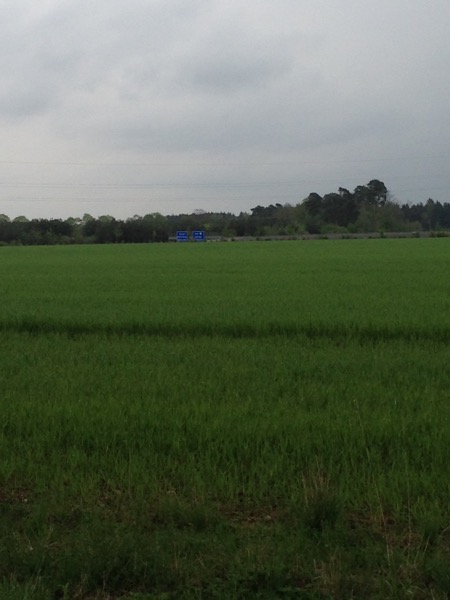For once I did get enough sleep, I had set my alarm for 5.45. I meditated a bit and wrote morning pages and then it was time to make breakfast.
The boy had his first day of school and everything went well, he even had the afternoon off. My husband showed up a little earlier than I thought he would and then we talked quite a bit.
I went running for the first time in weeks and am happy to say that while my knees are still sore at times running doesn’t seem to affect the pain. Maybe it’s making it less, even. I did 6.4 k, mostly walking but running as well:

You can see that there has been rain and there was a bit of a drizzle while I was out but the path is still mostly dry.

I came back home and helped to make lunch:

First meal I knew would agree with me and taste wonderful in almost a week.
I spent a lot of the day thinking about traveling with fructose-intolerance. When I’m home I don’t really notice it. I can eat everything my husband cooks and most of what is in the house. But when I eat elsewhere it all comes down to a constant stream of worry. Will there be too much onion in the sauce? Is it better to take the fish with the mustard sauce or the salad? How will the salad dressing affect me? Did I manage to pull out most of the onion and what did they put in?
Everything comes down to guessing what ingredients are in any given meal. There are usually no labels. I can eat bolognese sauce at home because my husband makes it with lots of meat and only a little carrot and tomato. Choosing from the menu is not about what I’d like to eat and what will taste good, it’s just about anticipating how my body will react to it.
And it’s not like I eat something and know half an hour later if it was okay or not. Which is both a blessing and a curse. I don’t usually have to rush to a bathroom right after a meal. But my long reaction time also means that the reaction hits me a day later when I don’t expect it.
And it isn’t as clear-cut as when you’re lactose-intolerant. We do tolerate a certain amount of fructose just fine. I eat blueberries and banana in my muesli each morning, and veggies all the time. Having some protein and/or fat with the fructose makes it better digestible. It’s a constant dance for balance. And you only know if you did it right a day or two later.
And I keep forgetting that we choose the things we eat at home for a reason. We eat this certain type of brat or wiener because we know they’re okay. But when I eat brats or wieners elsewhere they can contain too much fructose.
So when I travel I avoid veggies and sweet things and sauces and soups because I can de-construct a sandwich and pull out what I don’t want to eat but that’s near impossible with something pureed. On the other hand I tend to crave sweets when I travel because when I eat too much fructose or when I am exhausted I want something sweet. And since sugary things are okay in moderation when I’m at home I have them when traveling as well. Only more of them. Plus the food that is not great for me.
By Saturday last week I was feeling totally sick. I just wanted to stay in bed. I was dizzy and nauseous and sweaty and feeling faint. It took me a bit to realize that I would feel better immediately once the food had passed a little further along, and yes, two hours later I was fine again.
But the whole experience drove it home once again that traveling with a food intolerance is no fun. And explaining the complexity of it is much harder than saying, „I need to eat vegan,“ or „I’m allergic to onions.”
Next time I travel I will lay off the sweets and take more of my own food. But that’s what I said before the Hamburg trip as well.
Anyways. I taught my students, called the woman who was looking for a guitar teacher for her too young son back, had dinner and went to bed early.
Today there will be grocery shopping and teaching and preparation of the podcast.
It is good to be back home. I like traveling (apart from the food issues and the sleep deprivation) but I like being home much more.
Which is a good thing because I’m home way more often than I’m away.

